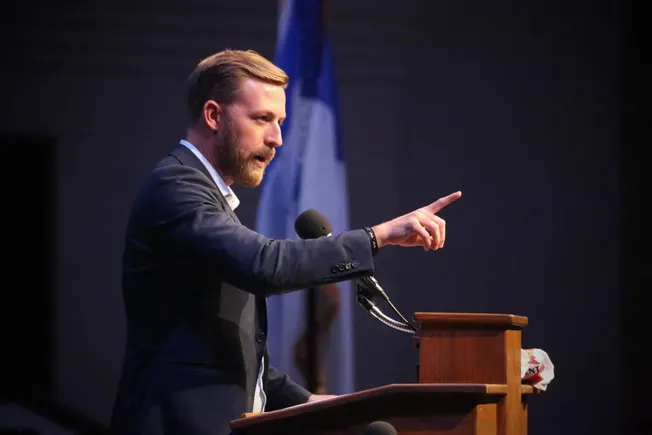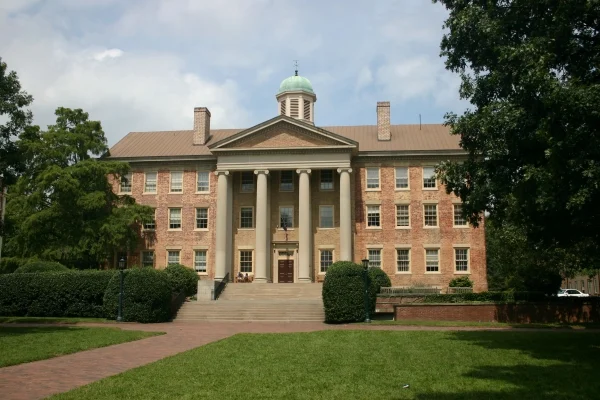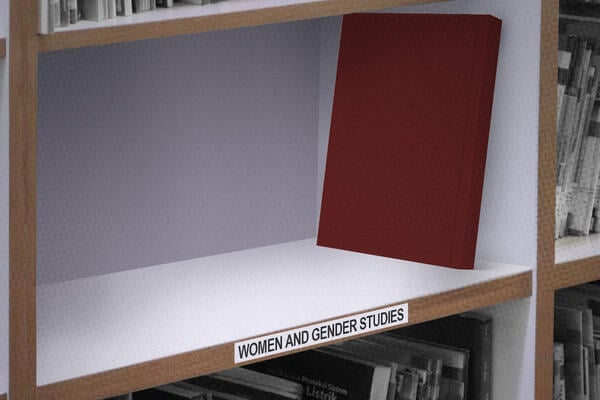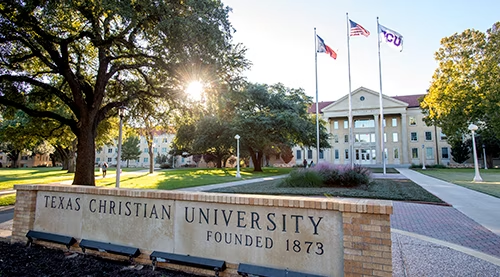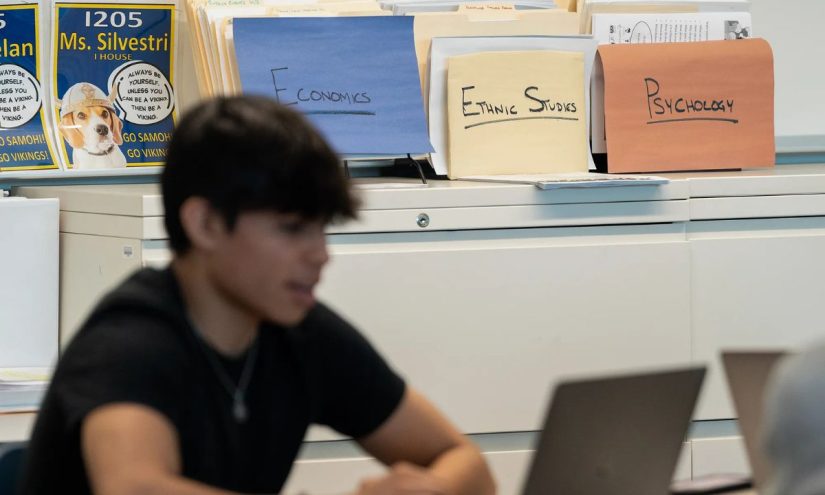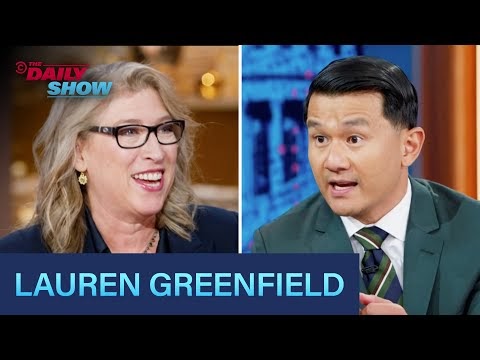For 67 years, the Department of Education has administered grants to universities to create centers devoted to foreign languages and area studies, a field focused on the study of the culture of a particular area or region. Now, those centers are under fire by the Trump administration, which has not released the funding the grantees expected to receive in July.
The grants support what are known as National Resource Centers, which were originally developed as a national security tool to help the U.S. increase its international expertise in the midst of the Cold War and the aftermath of Soviet Union’s 1957 launch of Sputnik. Since then, their purpose has shifted with the times, now focusing not only on producing scholars but also on community outreach and collaboration with K–12 schools.
The office responsible for administering the grants—International and Foreign Language Education—was dissolved and its entire staff laid off as part of the March reduction in force at the Department of Education. But it seemed IFLE’s programs, which were authorized under Title VI of the Higher Education Act of 1965, would live on; they were moved under the ED’s Office of Higher Education Programs, according to an internal communication shared with Inside Higher Ed at the time.
Since then, funding has come through “in fits and starts,” Halina Goldberg, the director of Indiana University’s Robert F. Byrnes Russian and East European Institute (REEI), told Inside Higher Ed in an email, though ultimately, the center received all its promised funds for fiscal year 2024–25. REEI was part of the first cohort of NRCs and has been continuously funded by the program since then.
But NRC directors, including Goldberg, are concerned the funds for the upcoming year—the final year of the program’s four-year cycle—may not come through, and that the Trump administration may be planning to demolish the program altogether. NRC leaders have received no notice from ED about whether or when the funds are coming, and some say their contacts at the department have expressed uncertainty about the program’s future.
The funding cuts appear to be caused by the Office of Management and Budget; records show that the agency has not approved appropriations for programs formerly housed in IFLE, including the NRC program, as well as the Foreign Language and Area Studies fellowships, which fund scholarships and stipends for undergraduate and graduate students studying these disciplines. In total, about $85 million was appropriated for IFLE programs for FY 2025–26, including $60 million for NRCs and FLAS.
“We’re just kind of in this holding pattern to learn whether our funds are going to be released or not. And there is some time pressure, because if that fiscal year 2025 funding is not allocated by Sept. 30, which is when the fiscal year, the government fiscal year ends, then it’s gone and we’re without funding,” said Kasia Szremski, associate director for the Center for Latin American and Caribbean Studies at the University of Illinois at Urbana-Champaign.
A Discipline in Crisis
NRC grant recipients worry about what the funding freeze and potential elimination of the program will mean for the disciplines of foreign language and area studies, which have already taken a beating in recent years; many colleges have eliminated such programs as cost-saving measures— including West Virginia University, which gutted nearly all of its language programs in 2023. More recently, the University of Chicago has paused admissions to all its humanities Ph.D. programs, including a slew of language programs, for the coming academic year.
Emanuel Rota, a professor in the Department of French and Italian at Urbana-Champaign who leads the university’s European Union Center, said he was already worried about the future of area studies and foreign language education, but “now I’m terribly scared.”
“I think this seems to be, at this point, slightly part of a trend to provincialize the United States in a way that is troubling for the future of this generation of students, who are, at this point, used to learning from other experiences around the world; knowing about ways of teaching, other ways of learning; establishing collaborations early on; and being able to be multicultural and multilinguistic like their peers around the world,” he said. “And all of a sudden they are told, ‘You only speak one language, you only know one culture and you only know your local environment, and you have to live with that.’”
It also comes amid efforts to quash other forms of cultural education and intercultural exchange. OMB also recently cut funding from a number of State Department exchange programs, according to Mark Overmann, executive director of the Alliance for International Exchange, which represents organizations that administer such programs.
Larger entities like the Fulbright program are being spared, he said, but the cuts include critical programming aiming at increasing STEM education access for girls around the world, fostering intercultural exchange with students in the Middle East, bolstering the study of foreign affairs in the U.S. and more.
International students and immigration broadly are also being targeted by the Trump administration, which has recently revoked thousands of student visas and increased barriers for overseas students studying in the U.S.
“I think international exchange programs, mobility, the presence of international students on our campuses have long been something that is supported in a bipartisan way, and that has been played out for decades in tangible ways,” Overmann said. “One would be increases in funding in both Democrat and Republican administrations, as well as Congresses. This is something we have seen transcend party lines and those across the political spectrum see that the mobility of our students, of our young professionals—both Americans going abroad and international students and professionals coming here—is something that supports our national security, our diplomatic interests, our influence around the world and our economy, down to very local levels.”
This isn’t the first time Trump has targeted NRCs. In 2018, during his first administration, ED criticized a Middle Eastern studies consortium at Duke University and the University of North Carolina for delivering programs it alleged had “little or no relevance to Title VI.” The programs under scrutiny included a conference about “Love and Desire in Modern Iran” and another focused on film criticism in the Middle East.
“It was probably a harbinger of what’s happening now,” said Brian Cwiek, a former IFLE program officer who lost his job when the office was dissolved. “I think that’s really where a lot of the same folks became intent on shutting down this same program.”
Area studies funding is also singled out in Project 2025, an agenda developed by the conservative think tank the Heritage Foundation that the Trump administration is following closely.
“Congress should wind down so-called ‘area studies’ programs at universities (Title VI of the HEA), which, although intended to serve American interests, sometimes fund programs that run counter to those interests,” Project 2025 reads. “In the meantime, the next Administration should promulgate a new regulation to require the Secretary of Education to allocate at least 40 percent of funding to international business programs that teach about free markets and economics and require institutions, faculty, and fellowship recipients to certify that they intend to further the stated statutory goals of serving American interests.”
Outreach at Risk
Although funding may still come through before the September cutoff date, some centers are already feeling the pressure.
At the Mario Einaudi Center for International Studies at Cornell University, which is home to two National Resource Centers, Kathi Colen Peck was responsible for administering an NRC-funded program focused on providing faculty development to professors at community colleges in upstate New York. Although the center has funding sources outside of ED, the community college program was almost entirely funded by an NRC grant.
The program involved bringing international speakers—a dance instructor from Benin, for example—to give workshops in community college classrooms, as well as administering a fellowship for community college professors to create curricular projects.
Once it became clear this year’s funding wasn’t going to become available when expected, Peck was laid off and the partnerships with community colleges for the upcoming academic year had to be discontinued.
“The intention of [the outreach program] is really to sort of bridge resources and help the community college faculty have connections to the area studies expertise at, for example, Cornell. They’re able to leverage resources at Cornell where they wouldn’t necessarily have access to that in any other circumstances,” she said. “It’s really about trying to help the community college faculty internationalize their curricula.”
At other campuses, cultural events and educational programs that NRC leaders say are immensely valuable to their communities could be on the chopping block. Hilary V. Finchum-Sung, the executive director of the Association for Asian Studies, said that the University of Michigan’s Korean Studies center, for example, hosts a free Korean film series at an off-campus theater that is open to members of the public. It’s an opportunity for members of the Ann Arbor community to see a film they likely never would otherwise—and to glean something new about a culture that they might be unfamiliar with.
On the flip side, NRC programs can sometimes give immigrants a rare chance to connect with their culture on American soil. Szremski, of UIUC’s Center for Latin American and Caribbean Studies, said the center has partnered with local libraries to hold a Latin American Story Time Program for about 15 years. At these events, they read children’s stories in English and Spanish, but also in other Latin American languages including Portuguese, Guaraní, Q’anjob’al, and Quechua.
“This is particularly important in Champaign and Urbana, because even though we’re in central Illinois, we have a very large and very vibrant Latino community, many of whom are native speakers of Indigenous languages,” she said.
Once, after a Latin American Story Time event, a library worker once told her, an older woman “came up to her in tears because she was a native Guaraní speaker and had never thought [she would] hear her native language again, really, now that she was living in the United States.”
Cwiek noted that some faculty positions may also be at risk without NRC funding; though the grants usually cover only a small portion of a professor’s salary, that portion may be the difference that allows a college to offer certain world languages.
Scholarship Uncertainty
Students are also in imminent danger of losing scholarships due to the funding pause. Graduate students relying on Foreign Language and Area Studies Fellowships to fund their education in the new academic year still don’t know whether they will receive that money. Szremski said on Friday that one incoming fellow recently made the choice to withdraw from UIUC and instead study in Colombia for the upcoming academic year due to funding fears. With UIUC’s academic year beginning this week, others were forced to make the decision about whether to come to campus without knowing if they would receive the scholarships they’d been promised. Across the university’s NRCs, 53 students are awaiting FLAS funds.
Other universities are in a similar position. At Cornell, 18 students will be impacted if the money doesn’t come through, according to Ellen Lust, the director of the Einaudi Center for International Studies and a government professor.
These fellowships provide the cultural awareness, understanding and skills that the U.S. “has relied on to be a world leader. Students who benefited from NRC support have gone on to join the US Foreign Service, engage in international business, and educate new generations of global citizens. They have conducted international collaborations and research that that ultimately benefit Americans,” she wrote in an email to Inside Higher Ed.
While the stipends allocated to undergraduate students are not as sizable as those for graduate students, Szremski said those recipients have told her they may have to take out private loans or start part-time jobs to fill the gap created by the missing FLAS money.
The future of these grants remains unclear. The Senate’s appropriations bill maintains funding for IFLE programs, so even if the funding doesn’t come through this year, the program may be able to resume the following year.
But if the NRC and FLAS programs are shuttered permanently, the effects will “be felt for generations to come,” wrote Lust.
“Our current and future students are the foreign service officers, intelligence analysts and CEOs of the future,” she wrote. “Within a generation, US citizens will be ill-equipped to live, work and lead in a global world. They will be outmatched by those from other countries, who speak multiple languages, understand diverse cultures and have built relationships across borders. Ultimately, these policies weaken the US’ global position and will make America less secure and prosperous.”

